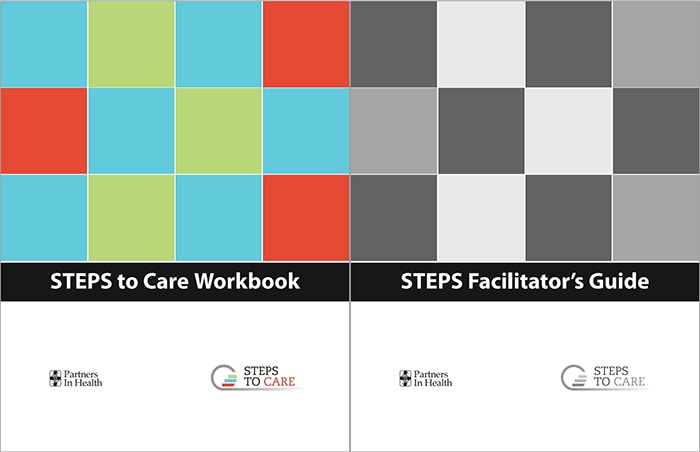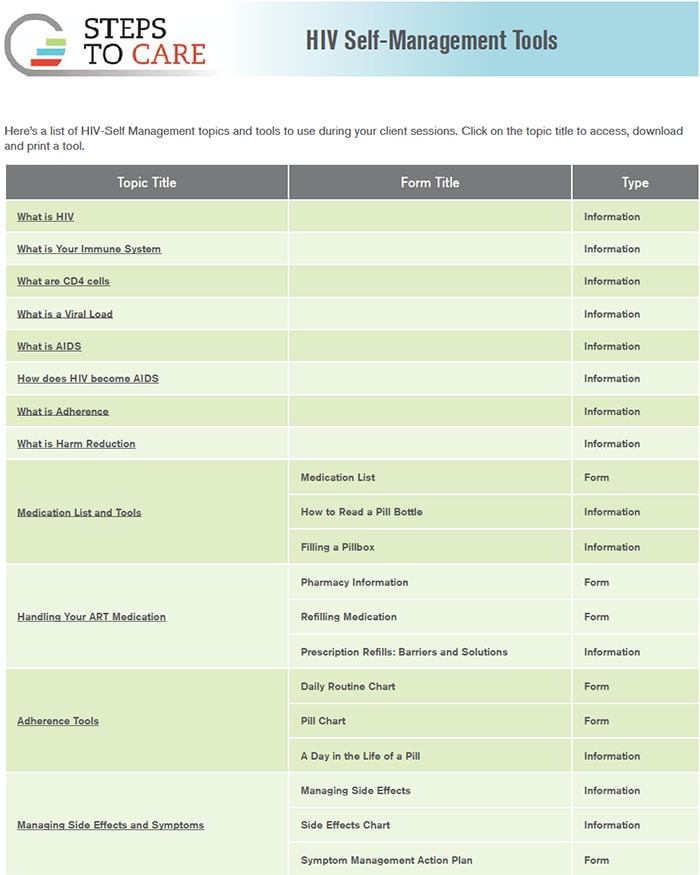STEPS to Care: HIV Self-Management
Building a strong relationship with your clients is the foundation for the HIV Self-Management strategy, a process through which Patient Navigators empower their clients to take control of their HIV and manage their overall health. Patient Navigators work one-on-one with clients in patient navigation sessions using educational information and tools found on the HIV Self-Management website (mystctools) and in the workbook. The goal of the HIV Self-Management sessions is to help clients work towards managing their own health and increasing adherence to their treatment plan through coaching, counseling, and accessible content.
After reviewing the HIV Self-Management information and resources below, you will know:
- How to select and deliver the appropriate HIV Self-Management tools and topics to clients
- How to use the STEPS HIV Self-Management website and workbook materials with clients
- How to select the most relevant and important topics for each client by using Motivational Interviewing techniques
Delivering HIV Self-Management Sessions
Best Practices for Delivering HIV-Self Management Topics
- Each education session lasts 20-40 minutes and happens during regular patient navigation sessions.
- At minimum, clients receive an HIV Self-Management education session four times a year in conjunction with their scheduled primary care visits. However, topics should be covered with clients when they are immediately relevant.
- In some cases, you may circle back to a topic multiple times if the client is struggling with it, or you may choose to skip a topic that the client is already comfortable with. Motivational Interviewing can help Patient Navigators determine which topics are most helpful in the moment.
- Patient Navigators build a strong and trusting relationship with their clients.
Most HIV Self-Management sessions will follow a three-part structure. Detailed instructions for each topic are available in the STEPS Facilitator’s Guide below:
- What is it?
- Why is it important for your client?
- What will they be able to do after the session?
- Use plain language and ask questions often
- Practice using the tool with your client
- Discuss how and where to keep the materials
- Ask the client to repeat back what you said
- Ask if they have any questions
- Remind them you can return to this topic at any time
Choosing the Right Self-Management Topics
When selecting topics to cover with clients, keep in mind your client’s:
- Current practices and goals for adherence: Where is your client with his or her adherence and what knowledge or tool will help your client get closer to reaching it?
- Personal, social, and medical barriers: What specific tools or resources will help address the complex issues in his/her life?
- Immediate needs: What happened last week? What’s happening this weekend? What tools, knowledge, or resources will help the client feel prepared to deal with challenges and setbacks?
- Psychological state: Is your client ready to discuss a difficult topic? Will your client feel comfortable asking questions?
- Personal interest: What does your client want to know? What has he/she asked for help with?
You can cover as many topics or as few topics as you need in any order you feel is best. There are core topics that most clients will need to review. These are outlined in the Facilitator’s Guide.
Using the Facilitator’s Guide and Self-Management Tools in Sessions
The Facilitator’s Guide contains lesson plans, discussion prompts, and instructions for Patient Navigators delivering the HIV-Self Management topics. It also includes guidance to help Patient Navigators assess whether a client is ready to begin a topic and highlights topics that may be particularly sensitive for clients and/or Patient Navigators. In fact, Patient Navigators should review the guide before meeting with their clients to prepare for their sessions.
Topics in the Facilitator’s Guide correspond with the HIV Self-Management tools in the workbook and on the mystctools site. As you read through and use the Facilitator’s Guide, you may find it helpful to have a complete copy of the workbook nearby for reference.
Using the STEPS HIV Self-Management Site
The My STEPS to Care website supports one-on-one education sessions between the Patient Navigator and the client. In your first HIV Self-Management session, Patient Navigators should review the site with clients and answer any questions they have about how to use the site and the materials.
HIV Self-Management Tools Chart [PDF – 2 MB]
This chart is a searchable list of all the tools and information on MySTCTools.org and the client workbook. It also contains page numbers for the workbook and Facilitator’s Guide for quick reference.
Motivational Interviewing
Motivational Interviewing techniques are important to pair with HIV Self-Management sessions when discussing behavior changes that are hard for clients to tackle, such as smoking cessation or adhering to their medication. When used correctly, Motivational Interviewing techniques build on the foundation of a strong client relationship to allow for non-confrontational conversations about a client’s abilities to overcome barriers and create behavior change.
The following are a few best practices for Motivational Interviewing:
- Listen with empathy and understanding of your client’s perception of the problems and issues and share your perceptions after your client has finished speaking.
- Encourage your client to recognize the need for change by highlighting the discrepancy between their behavior and their personal goals, thus enhancing client motivation.
- Enhance your client’s confidence to take action and noticing that even incremental changes are important.
- Use motivational interviewing when assessing your client’s needs and barriers, and when discussing difficult behavior changes.
Motivational Interviewing Resources
Following are external (non-STEPS to Care) resources you can use to sharpen your Motivational Interviewing skills.





